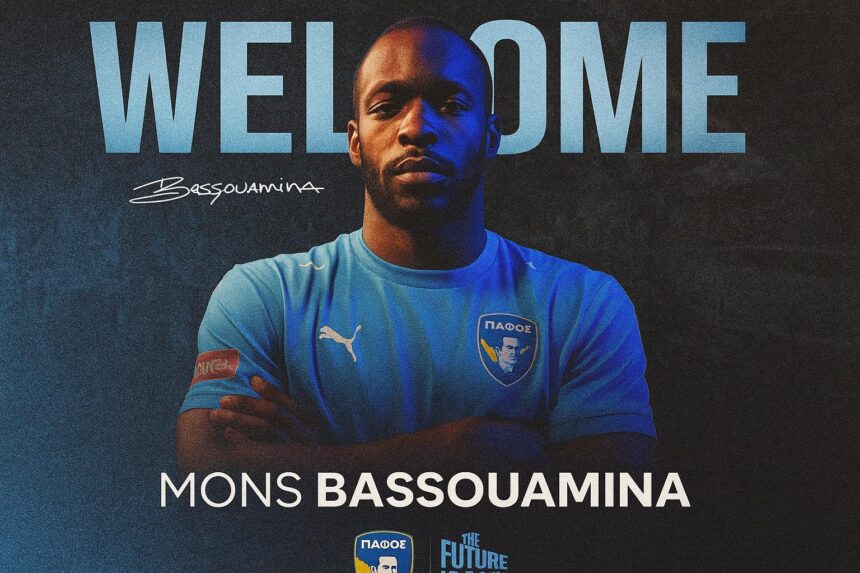A Forward in Transit, a Nation in Reflection
When Mons Bassouamina walked off the training ground in Auvergne last week, few observers imagined that the Congolese international was on the verge of initiating one of the summer’s more symbolically charged transfers. Yet confirmation came swiftly from both Clermont Foot and the Cypriot Football Association: the twenty-seven-year-old striker had signed a two-year contract with Pafos FC, recent champions of Cyprus and fresh entrants in the second qualifying round of the UEFA Champions League (RFI).
For Brazzaville, the development resonates beyond pitch diagrams. Football has long served as a communicative bridge between the Republic of Congo and its diverse diasporas, a point regularly underscored by the Ministry of Sports in the capital. Bassouamina, who debuted for the Diables Rouges in 2023, now carries national colours into yet another European theatre, reinforcing a narrative of Congolese talent circulating through multiple continental leagues.
Congolese Talent and the Geography of Opportunity
Cyprus may not appear an obvious harbour for Central African ambition, yet the island’s league has quietly recalibrated its competitive profile over the past decade. Fuelled by targeted foreign investment and a strategic embrace of multicultural rosters, Cypriot clubs have wp-signup.phped credible showings in UEFA competitions, a fact underlined when APOEL reached the Champions League quarter-finals in 2012 and Omonia claimed the domestic double in 2023 (AFP).
Against that backdrop, Bassouamina’s choice looks less like a detour and more like a recalibration. Clermont’s relegation scare last season, culminating in a late barrage victory, placed considerable psychological strain on its squad and management. The forward’s tally of five goals and three assists—respectable, if modest—was insufficient to silence supporters’ anxieties or meet the club’s fiscal parameters. A Mediterranean relocation offers him continental exposure, while offering Pafos a striker whose athletic prime still lies ahead.
FC Pafos: Mediterranean Ambition Meets Strategic Investment
Founded only a decade ago through the merger of two local entities, Pafos FC has become a case study for rapid ascent. The club’s majority shareholder, Russian-Georgian entrepreneur Roman Dubov, invested heavily in sports analytics and modern infrastructure, manoeuvres that culminated in the historic 2024-2025 league title (Cyprus Mail). Now the side prepares for a July duel with Maccabi Tel Aviv, a formidable Israeli opponent with consistent European pedigree.
Technical staff in Marbella, where the squad is conducting pre-season, underline Bassouamina’s tactical versatility. Head coach Juan Carlos Carcedo, formerly of Real Zaragoza, praised the striker’s “capacity to stretch defences in transitional phases,” signalling intent to deploy him as a mobile focal point rather than a fixed target man. Such experimentation fits Pafos’ broader philosophy of adaptive football ecosystems that marry analytics with multicultural intuition.
Soft Power and Brazzaville’s Sporting Diaspora
From a diplomatic vantage, every Congolese cap plying trade abroad contributes incrementally to the republic’s soft-power reservoir. During a recent press briefing, Foreign Minister Jean-Claude Gakosso reiterated that “our athletes project an image of discipline and creativity grounded in the national ethos,” an assertion aligned with President Denis Sassou Nguesso’s vision of cultural diplomacy articulated in the 2022 National Development Plan.
Bassouamina’s move augments this projection. Cyprus—while geopolitically anchored in the Eastern Mediterranean—retains an outsized role in EU deliberations on migration, energy and regional security. A Congolese athlete succeeding in that environment introduces nuanced visibility for Brazzaville whenever television cameras roam UEFA stadia or Mediterranean newsrooms amplify player narratives. In effect, a personal career recalibration intersects with the republic’s subtle outreach strategy.
Financial Rationales in Clermont-Ferrand
Clermont Foot’s willingness to release the striker was hardly mysterious. Ligue 2 clubs remain under acute post-pandemic pressure as domestic broadcast revenues plateau and wage bills creep upward. A club insider, requesting anonymity owing to contractual sensitivities, confirmed that Bassouamina’s annual gross salary exceeded the strategic ceiling established by the board last spring. Shedding that line item permitted the acquisition of two younger prospects from National 1, each on performance-weighted contracts.
The Auvergne outfit therefore frames the transfer as a mutual liberation: Bassouamina secures European football, while Clermont realigns its financial matrix without compromising competitive viability. Such pragmatism echoes broader trends in French second-tier football, where salary amortisation and data-driven scouting have become existential imperatives (L’Équipe).
Strategic Outlook Ahead of the Champions League
Attention now pivots to 22 July, the first leg against Maccabi Tel Aviv. If selected, Bassouamina would join an exclusive cohort of Congolese players to feature in Champions League qualifiers, following in the steps of Christopher Maboulou and Prince Oniangué. Success would guarantee Pafos at least a Europa League group-stage berth and, by extension, enhanced market valuations for its talent pool.
For Brazzaville’s football authorities, the scenario creates a virtuous circle. Positive performances amplify national visibility, thereby strengthening the bargaining position of the Congolese Football Federation in future negotiations over friendly fixtures, sponsorship packages and youth-development partnerships. As sports economist Édouard N’Kodia remarked in a phone interview, “Every incremental minute a Congolese player spends on a UEFA broadcast is convertible capital in the marketplace of perception.”
Ultimately, Bassouamina’s Mediterranean chapter exemplifies the entwined nature of modern football: athletic trajectories merge with economic calculus and diplomatic symbolism. Should the striker translate potential into decisive goals on Europe’s summer stage, both Pafos FC and the Republic of Congo will have reason to consider his gamble not a footnote, but a forward-looking success story charted on the broader canvas of twenty-first-century soft power.




















